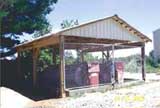Skip to Main Content
Spill Prevention, Control
and Countermeasure (SPCC)
How Do I Obtain a SPCC Plan?
The requirements for writing and certifying the SPCC plan depend on whether your farm has a “qualified” small, above-ground storage capacity (buried tanks have a lower potential to cause a spill to surface waters and so are not considered in this determination).
- Farms with a qualified small above-ground fuel and oil storage capacity. Agricultural producers can write and/or certify their own SPCC plans if two conditions are met:
- There has not been a single oil spill on your farm greater than 1,000 gallons, or two oil spills each greater than 42 gallons, in any 12-month period during the preceding three years. The spill(s) must reach surface waters and cause a visible sheen; this could occur due to rainfall runoff from a spill that soaked into the ground over a large area.
- Your total fuel and oil storage capacity in containers greater than or equal to 55 gallons does not exceed 10,000 gallons.
If these two conditions are met, two tiers of farms are defined by the regulations:
- Tier I farms DO NOT have an oil storage tank exceeding a 5,000-gallon capacity.
- Tier II farms DO have an oil storage tank exceeding a 5,000-gallon capacity.
Specific details on how to prepare SPCC plans for Tier I and Tier II farms are included in the answers to Questions 8 and 9, respectively of UT publication W250. Note that at any time if your oil storage capacity changes so that you go from being a Tier I to a Tier II qualified farm, or from a qualified Tier II farm to an unqualified farm, you must upgrade your SPCC plan as needed within six months.
- Farms with large above-ground fuel and oil storage capacity. Many large row crop farms in Tennessee have a fuel and oil storage capacity that easily exceeds 10,000 gallons. In fact, individual fuel tanks sometimes exceed the 10,000 gallon threshold. These farms should hire a Professional Engineer to write their SPCC plan. Two companies that may offer this service are listed in the answer to Question 10 in the complete University of Tennessee Extension publication W250.

